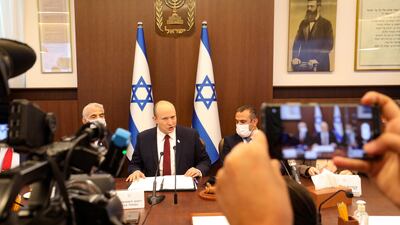Five European countries expressed “serious concern” at Israel’s designation of six Palestinian civil society organisations as terrorist groups after a UN Security Council meeting on Monday.
They will be seeking more information from Israeli authorities on the reasons for their listing.
The 15-member council took no action after the closed consultations. But a statement from Estonia, France, Ireland, Norway and Albania, which will join the council in January, said the listings “have far-reaching consequences for the organisations in political, legal and financial terms”.
They said they “will study carefully” information provided by Israel on the basis for the designations.
“A thriving civil society and respect for fundamental freedoms are cornerstones of open democracies,” said the statement read by Estonia’s UN Ambassador Sven Jurgenson after the council discussion. “Civil society is an essential contributor to good governance, human rights, international law, democratic values and sustainable development across the world, including in Israel and Palestine.”
“It also contributes to peace efforts and confidence-building between Israelis and Palestinians,” the statement said.
Last month, Israel said the six Palestinian human rights organisations were tied to the Popular Front for the Liberation of Palestine, a secular, leftist political movement with an armed wing that has carried out deadly attacks against Israelis. Israel and Western countries consider the PFLP a terrorist organisation.
But a confidential Israeli dossier detailing alleged links between the Palestinian human rights groups and the PFLP contains little concrete evidence, and it has failed to convince European countries to stop funding the groups.
Groups deny allegations
The six groups, some of which have close ties to rights groups in Israel and abroad, deny the allegations. They say the terror designation is aimed at muzzling critics of Israel’s half-century military occupation of territories the Palestinians want for their future state.
The designated groups are the Al Haq human rights group, the Addameer rights group, Defence for Children International-Palestine, the Bisan Centre for Research and Development, the Union of Palestinian Women’s Committees and the Union of Agricultural Work Committees.
Riyad Mansour, the Palestinian UN ambassador, told reporters “it was a good thing” that Security Council members “are not buying the evidence of Israel” that the six Palestinian groups are terrorist organisations – and it was also “a good thing” that Israel did not succeed in “creating fear” among council members that the groups are linked to terrorists.
“We welcome the defence of civil society organisations among the Palestinian people,” he said.
The five European countries also called on the Israeli government to halt settlement construction in the West Bank and East Jerusalem and not to proceed with tenders for some 4,300 housing units in Israeli settlements.
They pointed to a Security Council resolution adopted in December 2016, which states that settlements are illegal under international law and constitute a major obstacle to achieving a two-state solution to the decades-old Israeli-Palestinian conflict.
Mr Mansour said opposition to settlements from the Europeans and others on the 15-member council is “positive” but “it is not sufficient” because what is needed is the implementation of the resolution by the Security Council.

